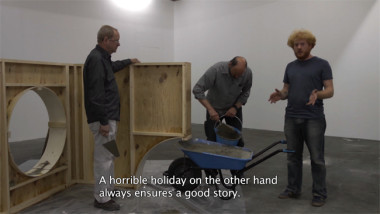From 3 October – 3 November, Chapter House Lane presents ‘Apathy is not my friend’ an exhibition curated by gallery director Louise Klerks, featuring new work by Ronnie van Hout, Feiko Beckers and Malcolm Whittaker. Join us at the opening from 6-8pm, Thursday 3 October.
For the artist, the point of making can seem somewhat absurd. ‘Apathy is not my friend’, as the title suggests, signifies the artist’s resistance to the state of apathy by personifying it as unwelcome company. In this exhibition, the artists take a stance against apathy using humour as a repellent. The three artists in this exhibition use themselves as the central figure in their practice to portray this awareness.
If you accept the human situation as absurd, the only thing left is to revel in the ‘essence of human experience.’ To which end, living and making in all its forms, actions, and a reception of the illogical are key. For an artist to question why might not be the point, rather the question becomes: why not?
Dutch artist, Feiko Beckers uses video and performance to create a language of the absurd inflected with sarcasm and humour. Recurring themes of failure and the incongruous appear in everyday scenes drawn from his life. He sets up engaging tales then interrupts the narrative unexpectedly, eliciting an altered reaction from his audience.
Ronnie van Hout, a New Zealander represented locally by Kalimanrawlins, unleashes his humour on the ego, positioning himself as subject in previous sculptural works Ersatz and The Thing. His new work once again serves as a comic substitute for the self-effacing reality of an arbitrary existence.
Malcolm Whittaker is an interdisciplinary artist, writer and performer based in Sydney. He does this in solo pursuits, as a member of performance collective Team MESS and in other collaborations with artists and non-artists. Each is a process of playing within the conventions, rituals and spectacles of the everyday – seeking to close a critical distance between the work and the viewer in order to open up a shared space of experience, exchange and possibility. The material situations of these spaces range from theatre and gallery settings to site-specific and public interventions to performance lectures, walks in the park, letters in the mail and the borrowing of books from the library.

